
NEW YORK, April 9, 2018 /
Christian Newswire/ -- Catholic League president Bill Donohue (photo) comments on a new Gallup poll of Catholics:
We knew that younger Catholics were going to church in fewer numbers than in the past, but what is new about this Gallup poll is the decline among older Catholics. Overall, only 39 percent of Catholics say they attend church weekly, and among those aged 60 and over the figure is 49 percent. This means that "for the first time, a majority of Catholics in no generational group attend weekly."
In 1955, 73 percent of those aged 21-29 attended church weekly, but now the figure is 25 percent. Among those 60 and over, 73 percent attended church weekly in 1955, but now the figure is 49 percent.
The number of young people professing no religion, nationwide, was only 1 percent in 1955. Today it is 33 percent. That is an increase of 3200 percent!
The Gallup poll reports the data, but offers no explanation.
There are many reasons for the decline in church attendance. Here are seven core reasons.
1) The declining role of religion in elementary and secondary education has been dramatic.
2) Higher education has become increasingly hostile to religion, especially Christianity.
3) The pop culture, as manifested on TV, the movies, and music, is marked by a libertinism that is at odds with Christianity.
4) The ascendancy of moral relativism--the denial of moral absolutes--has engulfed society. The nation's cultural elites are responsible for this outcome, including, sadly, some religious leaders.
5) Declining marriage rates, and birthrates among married couples, has made it easier for parents to neglect their religious duties, including obligations to their own children.
6) Those over the age of 60 are the baby boomers, a generation that in their youth experienced the decadence of the 1960s and 1970s. Many of them entered their senior years without a strong religious background.
7) The Catholic clergy, which in the 1950s expected the faithful to attend church--and they did--lowered their expectations in subsequent decades, yielding predictable results.
There is no iron law of history, except on the blackboard of ignorant professors, so a reversal of events is possible. But a culture doesn't change by happenstance: it takes a determined effort on the part of the nation's elites to reverse course. Regrettably, that day has yet to come.

